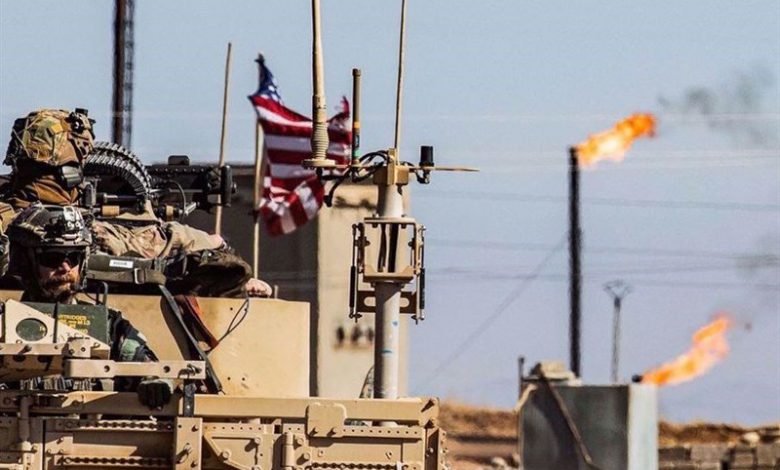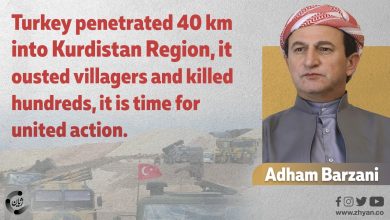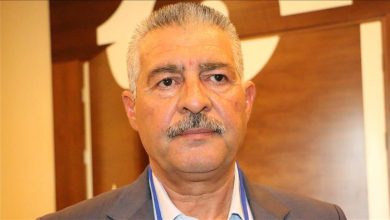US’s mad plan for Syrian oil
The US has had a mad plan to steal, or “save Syria’s oil”, since the day it told the Kurdish-led Syrian Democratic Forces (SDF) to get ready for the liberation of the non-Kurdish region of Deir ez-Zor, in eastern Syria (which holds Syria’s largest oil fields). The SDF, that has set their hopes on Western political support since the start of their quest for autonomy in Syria, eagerly took the bait.
At that point, Deir ez-Zor’s oil was processed in an amateuristic, primitive way and smuggled out of the region for $1.5million dollars a day under ISIS control. The oil was sold in Turkey and Iraq. In October 2017 the SDF, backed by US airstrikes, managed to ‘liberate’ these oilfields one by one, driving the remains of ISIS to its last desert enclave, Baghouz.
The US was quick to move in its troops, “to guard the oil”, and trained special SDF forces to accompany them. Now, both parties had the oil, but due to US-imposed sanctions, no way to sell it. Paradoxically, the US-backed SDF soon took over the former small-scale smuggling network, and started to sell Syria’s oil to the Syrian government, which the US had under “maximum pressure” sanctions, but protected the very same oil that was flowing to government-controlled territory at the time. A trade the SDF used to finance their political experiment in North-East Syria, and the US forcibly turned a blind eye to.
A Syrian Observatory for Human Rights estimate in August 2019 said 16,000 barrels per day were being smuggled from SDF-controlled areas to Syrian regime-controlled areas. With an additional 8000 barrels smuggled into North-Iraq per day.
Before Syria’s civil war started with an uprising of so-called “moderate rebels” in 2011 evolving into the following jihadist invasion, the country used to produce around 380,000 barrels of crude per day. Production is currently down to around 60,000 barrels per day, most of it processed in primitive refineries and transported by leaky pipelines causing massive environmental pollution.
The Israelian experiment
An American-Israeli entrepreneur tried to ‘fix’ the paradoxical situation above. He had a scheme that involved neither the Syrian government as buyer, nor an American company at risk of being sanctioned. Mordechai Kahana tried to pitch both the SDF leadership and the US government with a mad plan to circumvent the sanctions law on behalf of the Israelians, by hiring private contractors to transport the oil, through Iraq, to the Palestinian Territories in return for humanitarian supplies.
Kahana jumped into action around Christmas 2018, when US president Donald Trump announced it was “time to get the US troops home”, and Turkey invaded parts of SDF-held territory. He managed to meet with Ilham Ahmed, travelled to the region, and even filed an OFAC application by the names of Jihad Omer and SDF commander Mazloum Abdi after.
By March 2019, the SDF got back on earlier promises and told Kahana to stop attracting potential buyers using earlier issued documents, allegedly signed by Ilham Ahmed, probably after facing harsh criticism by the Syrian government, Russia and Iranian media. Though eager to sell the oil, the Kurds were clearly afraid that an Israeli-Kurdish deal would not help them secure their position in the region, something Mordechai Kahana had trouble to accept.
When the US government decided to keep several hundreds of troops in North-East Syria ‘to guard the oil’ after the last Turkish invasion of Ras al-Ayn and Ayn Issa, Kahana’s plan was swept off the table for good. President Trump appeared in front of the White House, stating his famous words: “We kept the oil. I like oil.” The US clearly wanted to take matters in own hands.
“What I intend to do, perhaps, is make a deal with an ExxonMobil or one of our great companies to go in there and do it properly … and spread out the wealth,” Trump said. He explained that protecting the fields prevents ISIS from reaching them and allows the Kurds to benefit from them. “The US must also reap its share,” he remarked.
Delta Crescent’s deal
On the 30th of July, articles started to appear on a US-SDF oil deal signed and acknowledged by the White House. Delta Crescent Energy LLC, a corporation organized under the laws of the state of Delaware, has apparently signed an agreement to market oil in territory controlled by the US-backed entity and to develop and modernize existing oil fields. Both parties had been in talks for “a long time” and Delta Crescent had received an OFAC license to operate in Syria only recently.
Sinam Mohamad, the Syrian Democratic Council representative to the United States, confirmed that Delta Crescent had signed an agreement with the autonomous administration. Lindsay Graham, the Republican senator from South Carolina who is close to President Donald Trump, had spoken to Mazloum Kobani, the commander in chief of the Syrian Democratic Forces (SDF) yesterday and that Kobani had informed Graham of the deal and asked him to relay details of it to the US president.
Graham confirmed that he had heard about the oil agreement from Kobane to CBS reporter Christina Ruffini, who then relayed this in a tweet. And during his testimony to the Senate Foreign Relations Committee today, Secretary of State Mike Pompeo told Graham he was “OK” with the deal. “The deal took a little longer, senator, than we had hoped, and now we’re in implementation,” he said.
The Syrian government’s reaction
On the 2nd of August, a reaction to this deal was published by the Syrian state news agency SANA. This reaction quoted a statement released by the Syrian Foreign Ministry: “This agreement is considered an integrated and aggravated theft and can only be described as a deal between thieves who are stealing and thieves who are buying, constituting an assault against Syria’s sovereignty.”
The “null and void” deal is “a continuation of the U.S. hostile approach toward Syria” by “stealing the resources of the Syrian people and hindering the efforts of the Syrian state to rebuild what has been destroyed by terrorism that is mostly backed by the U.S. government itself,” the ministry statement added.
The deal has caused a lot of controversy among pro-government Syrians, leftist activists and commentators and the pro-Turkey, pro-Russia, anti-American lobbies on social media. Even a large amount of SDF-followers seemed shocked by the deal struck by the party they know – and love – as “anti-capitalist”. Many condemn the deal as a conspiracy to steal Syria’s oil.
If a military response to this deal will follow after its implementation is yet unclear. Damascus has been reluctant to fight the Kurds and does not see them as a direct enemy, though siding and trading with the US this closely might change this.
Russia and Syria’s oil
Last year, Damascus gave Russia exclusive rights to extract oil and gas. Damascus hoped that with Russian companies and technology, the country’s resources would provide the revenue needed to rebuild the country. But only a small number of wells are actually under Assad’s control. In 2018 an offensive by Syrian forces and Russian private contractors against Conoco field, an SDF and American base in Deir al-Zor’s oil region, led to failure for the attackers. It showed that American forces were serious about staying in the area.
Turkish President Erdogan stated that he invited Vladimir Putin to jointly manage the oil fields in the Syrian province of Deir ez-Zor instead of the Syrian Democratic Forces (SDF), which is led by the Kurds who currently control the fields, in March 2020.
“I made the offer to Mr. Putin that if he gives financial support, we can do the construction, and through the oil obtained here, we can help the destroyed Syria get on its feet,” Erdogan told reporters.
Russia itself has shown little interest to take the “Syrian oil for themselves”. Syria’s oil resources are rather small and cannot compete to other world market trade players. If Russia would be lured in a battle for the oil fields, it will be about finding its strategic ally Bashar al-Assad a ways to pump up the economy and make ends meet.
Turkey’s reaction
One of the greatest concerns might be Turkey’s reaction to the US – SDF oil deal. One of the key disagreements between Turkey and the US on Syria has been about the latter’s local cooperation with the SDF.
The Turkish Foreign Ministry condemned “the oil agreement between an American company and the terrorist YPG-led administration in northern Syria” , saying that the “country’s natural resources belong to the Syrian people” on August, the 3rd.
The ministry also condemned the U.S. for supporting the deal, “which disregards international law, Syria’s territorial integrity, unity and sovereignty and finances terrorism”.
What will happen now?
Though inside information on the exact agreement of the oil deal has not been published yet, it is hard to say what the US-based company will actually do in the SDF-held territories of Syria, how it will transport the oil out of the region, and if the revenues are even worth the investments required.
What it does clarify is the US’s intention to stay in the region, making Deir ez-Zor a permanent base. This is something that is likely to anger the Syrian government – which views Washington as unrightly occupying Syrian soil – and its allies Russia and Iran. Iranian militias currently control the Albukamal region of Deir Ez-Zor, not at all that far from the Deiri oil fields.
Turkey has been clear that it does not tolerate any PKK-affiliated parties controlling territories at its border, it has already invaded and captured SDF territory multiple times, and has shown interest in Syria’s oil before. Turkey itself is a vast importer of oil.
The US siding more closely with Turkey’s foe, might also disrupt US-Turkish relations. This will bring Turkey even closer to its Astana-colleagues Russia and Iran to provide for a sustainable solution in Syria, which excludes the US.
However, deals like these can go both ways. It will either help the Autonomous Administration to flourish economically, or it will mark it as a target even more, and become its end. Selling Syria’s oil to the enemy, may close the door to reconciliation with the government for good.
The SDF itself has not reacted to the oil deal yet.






